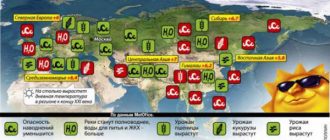 A photo from open sources
A photo from open sources
In this world there is nothing unique, therefore, only practice proves the viability or fallacy of one or another statements and conclusions of scientists. Unfortunately, such errors are sometimes very expensive for society, since the failure of some innovative proposals come to light only after many years, when stopping their implementation mechanism is not so simple, or even impossible due to huge investments, writing heaps doctoral dissertations and even receiving for this the Nobel premiums.
Approximately such a picture in the world can be traced with alternative solar and wind energy, the fallacy of which today it is still difficult (almost impossible) to recognize, although the leading countries of the world, such as Japan and the USA, for some reason are intensely returning to coal TPPs and nuclear power plants that thoughtlessly stopped them just because green ideas.
 A photo from open sources
A photo from open sources
Organic agriculture was also not indisputable in this regard. economy that is also promoted and pushed around the world under the banner of ecology and the fight against global warming on Earth. But as an international study found out, Chalmers University of Technology, Organic forms of farming are even more disastrous for our the planet.
The fact is, the authors write that organic cultures without already familiar chemical fertilizers exhibit lower crops, and therefore (whether we want it or not) require large areas, high energy costs lead to greater deforestation, and in ultimately, to greater CO2 emissions. Concerning organic livestock (to clarify), then it requires organic field cultivation, and therefore it is characterized practically the same disadvantages.
Recently published their findings in the journal Nature, scientists give an example: peas in “green” Sweden approximately 50 percent more negatively affects climate than the same crop, grown traditionally. As for others crops, then the picture is even worse, for example, 70% of winter wheat in organic farming is environmentally harmful percent more than with the usual form of cultivation.
 A photo from open sources
A photo from open sources
Introducing the so-called “alternative costs “and making a schedule of CO2 emissions, depending not only on quantities of organic food produced (including meat, milk), but also losses from deforestation for this reason (which previously somehow silent), scientists from the Technological University Chalmers concluded that with “green” rural economy is not so simple as it seemed at first glance.
No, the research team strongly does not oppose organic farming and animal husbandry but believes in this it’s impossible to be guided only by good environmental impulses, and therefore, in each case, the transition to such agricultural production everything must be carefully weighed and calculated, as they say, seven times measured before cut…






